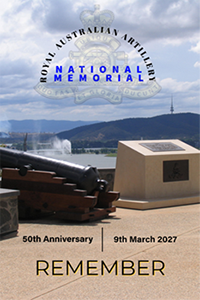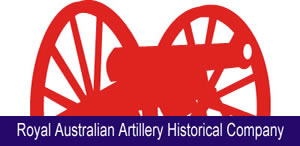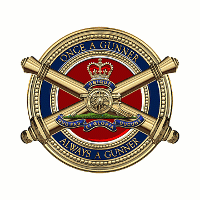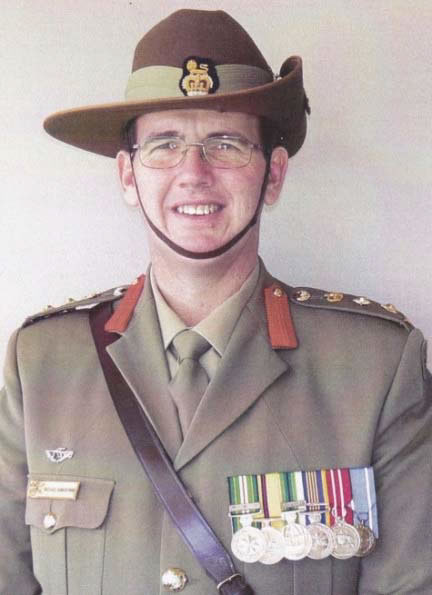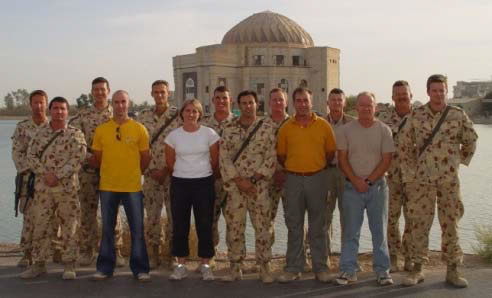| Printed Version |
|
|
|
|
| |
|
|
|
|
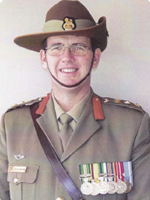 |
|
Colonel Michael James Kingsford, CSC, passed away suddenly and unexpectedly on 14th May 2013 whilst walking on Mount Macedon during a Defence‐related activity, and in his capacity as the ADF Military Adviser to the Australian Civil‐Military Centre (ACMC). Thankfully, he was in the company of comrades and friends who provided professional aid, loving comfort and prayers as he passed. Those present respectfully described it as ‘a truly special moment’ .
Michael was an artillery officer of significant standing. He dedicated some 32 years to the profession of arms, and throughout that time demonstrated true commitment to excellence and unwavering loyalty to nation, superiors and subordinates. Those of us who knew him recall with real fondness an officer of great personal drive and enthusiasm, which he combined with humour, personality and true warmth of emotion for his family, comrades and friends.
|
| |
|
|
|
|
| |
|
|
|
|
| |
|
|
|
|
The son of Paul and Patricia, brother of Louisa, Catherine and Rosalind, Michael was born on 11th June 1964 in Bundaberg, Queensland. Whilst at RMC Michael met his beloved Mary, who he married in 1989 in Duntroon’s ANZAC Memorial Chapel, following commissioning and posting to 4th Field Regiment.
Frank Colley recalled that these newly‐weds injected much life and good humour into the Mess, and their devotion to each other was evident from the start. That said, over the years Mary’s ‘knowing smile’ at yet another of Michael's jokes or cheeky remarks had necessarily become very well practiced!
That they went on to enjoy a great marriage and produce such a loving family together was no surprise. They raised four beautiful children – James Nicholas, Lachlan Matthew, Nathaniel Michael and Madeline Phoebe – each of whom they are both rightfully eternally proud. |
|
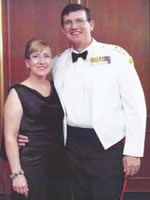 |
| |
|
|
|
|
| |
|
|
|
|
| |
|
|
|
|
|
| |
|
|
| |
|
|
|
|
| |
|
|
|
|
| |
The astute, caring & jovial professional who led from the front |
|
| |
|
|
|
|
| |
|
|
|
|
|
|
| |
Michael’s military career began in 1981 with the Army Reserve’s Queensland University Regiment. Having then decided to join the Regular Army, in 1986 he completed his Reserve service as a Second Lieutenant in 104th Field Battery, 1st Field Regiment. In January 1987 he marched‐in to Kokoda Company, RMC Duntroon. Michael’s experience in the Reserves no doubt stood him in good stead, but classmate Steve Grace recalled that it was Michael’s ability to quickly assimilate information combined with his diligence, loyalty and fun‐loving nature that saw him eSergeant (BQMS) in 1st Class, he dealt firmly but fairly with the junior classes and was well respected – particularly by Kokoda Company 3rd Class – because of his natural preference to mentor. Twenty years after Graduation, Michael recalled with great pride the 1988 Presentation of New Colours by Her Majesty Queen Elizabeth II.
As BQMS Michael flawlessly carried the Colours; the words of command and accompanying drill movements forever etched in his memory. On reflection, Classmate Michelle Bilston cites the motto of RMC Class June 1988 – ‘It’s quality not quantity’ and recalled that Michael truly was quality through and through.xcel from the start. At RMC Michael played Rugby and developed lasting friendships. Appointed Battalion Quarter Master Sergeant (BQMS) in 1st Class, he dealt firmly but fairly with the junior classes and was well respected – particularly by Kokoda Company 3rd Class – because of his natural preference to mentor. Twenty years after Graduation, Michael recalled with great pride the 1988 Presentation of New Colours by Her Majesty Queen Elizabeth II. As BQMS Michael flawlessly carried the Colours; the words of command and accompanying drill movements forever etched in his memory. On reflection, Classmate Michelle Bilston cites the motto of RMC Class June 1988 – ‘It’s quality not quantity’ and recalled that Michael truly was quality through and through.
In 4th Field Regiment Michael served in all three batteries and fulfilled nearly all appointments a lieutenant can. Dan Burns recalled that Michael was an excellent forward observer (FO), both technically and as a fire support planner and adviser. Mike’s FO party was very tight, and took quiet pride that under his leadership they were the best FO party in the regiment – and at a time when there were eight fully‐manned FO parties! Frank Colley returned to the regiment as Battery Commander (BC) 107 in January 1989 and Michael was his Gun Position Officer. Frank recalled that Michael was a remarkable lieutenant in many ways. He stood head and shoulders above the other subbies – both literally and figuratively in his attitude to his work. He was intelligent and assimilated
new things quickly, but at the same time was eager to learn and make the most of every opportunity to do so. He quickly earned the respect and high regard of all ranks in the battery and the wider regiment for his good humoured approach, professionalism, and care he showed for his soldiers.
These were sound tenets that remained predominant throughout Michael’s life and military career.
In 1992 Michael was posted as Staff Officer Grade Three (Operations), Headquarters 13 Brigade. This was his first overseas posting as he liked to say, and one which frequently required him to explain to colleagues elsewhere that ‘yes’ we did actually have a 13 Brigade, and it was in Perth ‐ Australia! For his service in 13 Brigade Michael was awarded an Australia Day Medallion. Michael returned to 4th Field Regiment in 1994 as Battery Captain 101st Field Battery. John Cox (then Directory Artillery) recalled that in 1995 Michael was given the tough task of being the first officer not promoted from the ranks to lead the artillery cell in the Soldier Career Management Agency. Inger Lawes – formerly a champion warrant officer, and who went on to successfully command 16th Air Defence Regiment during a very challenging period reflected on Michael’s superior soldier career management skills, sage advice and dependability. Inger noted also that these were indelible facets of Michael’s character that would again prove invaluable during Michael’s later appointments as Provost Marshal– Army (2005) and Commanding Officer (CO) 4th Field Regiment.
| |
|
 |
|
|
| |
|
|
|
|
In 1997 Michael embarked on his first operational deployment. It was to the United Nations Truce Supervisory Organisation (UNTSO), which was responsible for monitoring ceasefires and armistice agreements in the Golan Heights. During the tour Michael was promoted to the rank of Major, and became the Operations Officer for the Observer Group Lebanon. His professional performance made a truly positive contribution to UNTSO’s mission. At that time the posting was accompanied. During leave Michael, Mary and James made the most of every opportunity to explore and experience one
of the most culturally significant areas of the world. The family photo albums are a testament to this.
From 1998‐2000, Michael commanded 107th Field Battery. James Francis recalled fondly a night on exercise in September 1999. With the change of season comes wild Westerly wind on High Range as all gunners know. The BC’s vehicle was perched on the Observation Post under a camouflage net. In the early hours of the morning following a night of wild wind and rain, the pegs securing the net flew out like loose teeth and the poles holding the net off the vehicle fell on the party sheltered underneath. The BC’s Ack went from man to man checking that each was OK and then repaired the net. Michael – having received a tent pole across the head in his sleep and indignant that the sergeant had not checked on him piped up – ‘Are you going to check on me Sarge?’. The sergeant asked if he was OK and Michael replied that in spite of the sizable pole bludgeoning him, he was in fact OK. The sergeant persisted in asking for Michael’s reassurance that he was OK. The BC, now placated that he was being cared for equally, reassured the sergeant that he was fine. The Sergeant then said ‘Can you keep it down then sir, the diggers are trying to sleep!’. After a pause and in a low register, Michael responded ‘Sarge, the ice you skate on is very, very thin’. As usual, the party got through the ordeal in good humour. Michael was fun‐loving, but always decent enough to only take the mickey out of others in a pleasant way. Equally, he always received their retorts with good grace and a warm smile.
Following command of 107th Field Battery, Michael trooped off to London – Mary and James in tow – where he was to become an indispensable member of the UK Defence Intelligence Staff (DIS) working in the land weapons technical intelligence team. Michael’s work in the DIS remains classified, but it can be said that he left two significant legacies. The first was a superb database that his successor Craig Furini relied upon daily. The second was a team with high morale; each member all the happier for Michael’s camaraderie and leadership. Craig recalled also that it appeared for some time there might be a third legacy – a behemoth 1980s Mercedes saloon. Both men however thought the car a classic, but it proved difficult to sell and adorned Craig’s footpath for months. In
the end it sold for GBP125; about what you’d spend on a nice dinner in Knightsbridge! It was also during this posting that Michael and Mary’s second son Lachlan was born.
Upon his return from the UK, Michael assumed the appointment of Deputy Director Weapon Systems (Land) in the Defence Intelligence Organisation working for Steve Meekin. Michael impressed Steve as a capable and clever officer with a good and occasionally wicked sense of humour. Steve recognised that Michael certainly had the respect of his peers, and rapidly built upon an already well‐deserved reputation as a technically competent senior analyst and a strong and thoughtful leader. On top of strong performance, it was with these demonstrated characteristics in mind that in early 2003 Michael was selected as the contingent commander for the ‘Australian Iraq Survey Contingent (ASISC‐1)’. The diverse team of ADF and civilian technical experts and specialists
became Australia’s contribution to both the search for Saddam Hussein’s Weapons of Mass Destruction, and the battlefield recovery of large quantities of the regime’s conventional weapons. That the contingent included civilians and a civilian female added complexity. Michael did a superb job of moulding a rather disparate group of highly educated and experienced personnel into a coherent team that was very motivated and ready for a broad range of missions in a dangerous space.
Michael’s considerable leadership and staff planning skills came to the fore and shone throughout the six months in Iraq operating in very trying circumstances. At the time, the security situation across the country was beginning to deteriorate with the first improvised explosive devices (IED) being used in a rudimentary manner, and insurgent operations becoming more widespread in the chaotic months post‐liberation. To top it off, temperatures across the summer of 2003 exceeded 50C for 60 days in a row in central Iraq. As the intelligence officer for the 550‐strong, three‐nation Joint Captured Materiel Exploitation Centre (JCMEC), Michael was responsible for assembling the intelligence to enable the planning and execution of force protection operations for over 300 collection operations across Iraq. Michael approached the task with professionalism of the highest order, demonstrating a high capacity for work under tough conditions in an uncertain and volatile security environment. That there were so few battle casualties – despite the deteriorating security situation – was testament to Michael’s meticulous planning and lead role in the risk analysis phase of the mission planning process.
|
| |
|
|
|
|
| |
|
|
|
|
Never one to lead from the rear, Michael also commanded
and participated in a number of missions across Iraq, including
one assisted by Chris Connolly that was subjected to an IED
attack by insurgents. On 29th August 2003 Michael
commanded Mission 368 returning from an exploitation
operation at Al Habbaniyah Airfield West of Fallujah when a
string of buried artillery projectiles were partially detonated
beside the lead vehicles in the convoy. Michael instinctively directed the convoy to safety having
immediately accounted for the men and women under his command .
John Logan (a Defence civilian with the JCMEC) observed that Michael was always conscious of the importance of the mission but was never reckless with human life to achieve an objective. Michael’s considerable leadership skills and professional approach were also evident as he fought for recognition of the efforts of his contingent, particularly in seeking some form of recognition for recognition of the efforts of his contingent, particularly in seeking some form of recognition for
Australian public servants. This finally occurred in early 2013 with the establishment of the Australian Operational Service Medal; something Michael was justifiably very proud of as a long standing advocate.
|
|
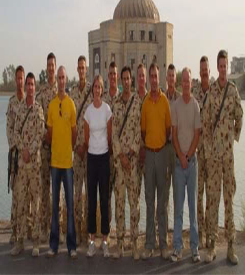 |
| |
|
|
|
|
| |
| |
In his final regimental posting Michael commanded 4th Field Regiment. A relatively large unit in excess of 500 personnel, it included A Field Battery located at Holsworthy Barracks. Michael described the challenges of commanding soldiers geographically separated by 2,000 kilometres as well as deputising during the operational absence of Commander 3rd Brigade. But, given the relationship he had developed with all ranks of the regiment over his service, he regarded the command as the highlight of his career. It was however, a particularly hectic and emotionally demanding period. Michael oversaw the dispatch of hundreds of troops on overseas service. Tragically also, Michael’s second‐in‐command was killed in a vehicle accident. And, Michael’s innate compassion was also most evident when he described his distress when embarked in the South‐West Pacific on Operation QUICKSTEP, and Blackhawk 221 crashed over the side of HMAS Kanimbla and sank in deep water, resulting in two fatalities. In 2008 he was most deservedly awarded the Conspicuous Service Cross (CSC) in the Queen’s Birthday Honours List:
‘Colonel Kingsford was fundamental to increasing the welfare, skills and operational effectiveness of his unit. His commitment to providing superior leadership, exemplary guidance, and support to all Brigade personnel was outstanding. His commitment, leadership and outstanding achievement as Commanding Officer of the 4th Field Regiment and Brigade Commander Rear, 3rd Brigade are in the finest traditions of the Australian Army and the Australian Defence Force.’
Nick Rowntree (Sapper officer, ASISC‐1 team member and Staff College Classmate) opined also that Michael’s solid performance as CO 4th Field Regiment was no doubt a key contributing factor in his selection and appointment as Chief of Staff at the Australian Defence College (2008), and
Commandant of the Combined Arms Training Centre (mid‐2008 to December 2010). In 2011 Michael completed the Defence and Strategic Studies Course. He held a Graduate Diploma in Asian Studies, and a Masters in Defence Studies.
In 2012, Michael deployed to Afghanistan with the Headquarters of the International Security Assistance Force in Kabul as the Director of the Transition Cell. The UK’s Brigadier Richard Cripwell recalled that Michael’s work was largely invisible to most, but was absolutely vital and he regularly briefed the NATO Ambassador and senior Afghans. His command and staff skills were excellent; he managed a small multi‐national team extremely well and could be trusted to deliver very politically‐complicated packages that were scrutinised from the President down. Michael also ran the physical transition ceremonies which played an important role, but had the potential for numerous problems. To his credit, none of the ceremonies under Michael’s care went awry. Richard observed also that perhaps Michael’s greatest skill was empowering the Afghans with a sense of confidence that they could do it themselves, and his patience and tact were crucial in achieving the successes of that time. The mentoring traits evident in Michael’s early days at RMC had once again shone through – with positive strategic effect. |
| |
|
|
|
|
|
| |
|
|
| |
|
|
 |
|
| |
|
|
|
|
| |
|
|
A compassionate ornithologist |
|
No tribute to Michael Kingsford would be complete without reference to his passion as an amateur ornithologist. A member of several ornithological groups, Michael was also published in The Atlas of Australian Birds. In 2013 he took this striking image of a family of Superb Fairy Wrens. It instantly became his favourite as it captured nature’s beautiful bond between father, mother, and baby. Annika Hilding‐Norberg of the Folke Bernadotte Academy in Sweden (which provides the secretariat for the International Forum for the Challenges of Peace Operations) recalled with fondness that Michael had become a dear friend to all beginning in New York and deepening during their time in Entebbe, Uganda during 2013. Michael’s sound professional acumen aside, all at the Entebbe workshop remembered his compassion and keen interest in bird watching. On‐task, Michael kept the group cheerily focused, and after hours he led them on walks which opened their minds to the inherent beauty of nature, the wonder of birds, and the gift of flight.
|
|
 |
|
Amid the destruction and chaos of a recently‐liberated Baghdad (2003), Michael and Chris Connolly noticed the struggle for life of a baby Plover grounded near the Australian JCMEC’s lines. Michael detected distress in the parents’ behaviour. Michael and Chris took turns to place clean water near the young one daily, but alas it died after about a week. Chris solemnly recalled Michael’s genuine distress as he cupped the baby bird in his hands, and respectfully buried it out of sight of the parents. Michael and Mary’s third son Nathaniel had just been born. Perhaps Michael’s emotions as a loving father were magnified at this time; who is to know. What was apparent to Chris at that moment was that Michael Kingsford – a most capable Australian Army officer – was also a man of
true compassion and kindness; and one who truly loved even the most common of birds.
Michael Kingsford was a man of good humour, hence it is fitting that we round‐out our tribute with some humour. Rob Crawford oft recalled an event on Exercise Kangaroo 89 (in the middle of Australia’s Northern Territory), where Michael’s love of birds and sense of humour rose to the fore. Indeed, said interest in birds almost resulted in the 107 Gun Group executing a full counter‐ambush drill during a short halt! Michael (as GPO), pointed excitedly at something from his Land Rover. All believed he had seen ‘the enemy’ and began to stir out of the usual convoy trance‐like state. Trying to work out what he could see, Rob eventually shrugged and made one of those ‘I don't understand’ faces. Michael dismounted and started to run to the Battery Leader’s car. Rob dismounted. Most excitedly – and still pointing – Michael said that he could see some bird, for which he spouted the scientific classification! As both officers had dismounted, two gun detachments did the same and the sergeants started to swing their men into action in the direction of Michael’s gesticulation. The old ‘follow the leader’ effect kicked‐in and soon about three‐quarters of the Gun Group had dismounted! Michael looked at Rob and said ‘What are they doing?’. Rob looked back at Michael and explained that they, like he, probably thought Michael was pointing at ‘the enemy’. Several expletives followed. After a pause, Michael said ‘Well get them mounted or we'll be late to the next position and I'll blame you!’. Michael laughed, smiled warmly, and walked back to his Land Rover. |
| |
|
|
|
|
| |
|
|
|
|
| |
|
|
Repose |
|
| |
Michael Kingsford was a thoroughly professional and capable Army officer who was conspicuous in his service. He built solid, happy teams and was always willing to work with others. More importantly though, he was a great bloke with true personality who touched the lives of many, enjoyed life and loved his family. The Royal Regiment of Australian Artillery and the wider Army are poorer for the loss of his many contributions. But, we are all also so much richer for the leadership, caring, enthusiasm and humour that this good man brought into our lives.
On a pleasant Thursday 30th May 2013, Colonel Michael James Kingsford’s Funeral Service with Full Military Honours in the ANZAC Memorial Chapel at RMC Duntroon drew a massive congregation of family, friends and colleagues. At the completion of the service, his remains were respectfully laid to rest in the tranquil Hall Cemetery, ACT. Later, a Wake was held in the RMC Officers’ Mess, where all ranks paid homage to this good man, and recalled precious time shared with the big bloke with a big heart. |
| |
|
|
|
|
| |
|
|
|
|
M.J. Kingsford’s operational service in Iraq is recorded in stone on the Australia’s Memorial Walk, North Head, Sydney – position P3‐119.
|
| |
| |
| |
A life made beautiful by kindly deeds,
A helping hand for others’ needs,
Big was his heart,
His friendship true,
Loved and respected by all he knew.’
Ubique. |
|
|
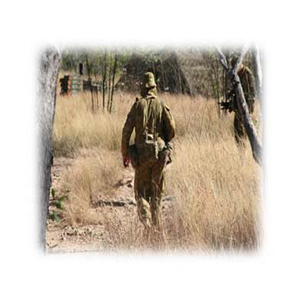 |
|
|
|
|
|
| |
| |
|
| |
|
|
|
|
| |
|
|
|
|
| |
|
|
|
|
|




